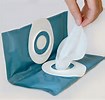
Wet Wipes also part of lethal fibres in pollution issues
The annual value of the EU wipes industry is £27 billion but wet wipes used by so many people for all kinds of cleansing purposes should not be flushed down lavatories as they are causing pollution in the sea, rivers and lakes throughout the world. It will take 500 years for plastic wipes to break down in landfill. Both plastic and polyester in wet wipes cause the release of millions of microscopic pieces of plastic which endanger wildlife. This information comes after similar information on microbeads – the beads often found in cleansing gels. Scientists found the particles had become dispersed throughout the oceans and were common in the guts of animal plankton, fish and birds. Samples of sea water were found to all contain these unwanted beads.
Cellulose and manufactured fibres like polyester are very bad for water and should be put in a bin not flushed down toilets. They do not break down or re-cycle in a healthy way. Unilever confirmed it was “upgrading its packaging”. The Anglian Water company recently dug 21 tons of wipes from its sewer system in London including sanitary products. Plastics found in the guts of marine life and sea birds pose a very serious threat to their lives.
